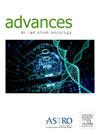Efficacy and Safety of Metastatic Directed Treatment of Oligometastatic Disease: Results of a Meta-analysis
IF 2.7
Q3 ONCOLOGY
引用次数: 0
Abstract
Purpose
In patients with oligometastatic disease (OMD), local therapy to metastatic sites has gained acceptance despite uncertainty regarding its long-term benefits or whether some subgroups would benefit more than others. Here, we report a meta-analysis of randomized controlled trials (RCTs) aimed to evaluate the efficacy and safety of adding stereotactic radiation to metastases versus the standard of care (SOC) in treating OMD.
Methods and Materials
A meta-analysis was conducted following Preferred Reporting Items for Systematic Reviews and Meta-Analyses guidelines. Studies were identified from Medline and Embase databases from inception to July 16, 2024. The inclusion criteria comprised RCTs involving adults with oligometastatic solid tumors receiving metastasis-directed therapy (MDT) compared to SOC alone. OMD was divided into 4 groups according to the time of intervention: upfront therapy, consolidation therapy, unselected and oligoprogression. The primary outcomes were progression-free survival (PFS), overall survival (OS), time to new lesion (TNL), and treatment toxicity. Hazard ratios (HR) for PFS, OS, and TNL were extracted. Odd ratios (ORs) were calculated for adverse events grade 3 or higher. Data were analyzed using random effects models, with statistical significance set at P < .05.
Results
Fifteen RCTs comprising 1414 patients were included. MDT significantly improved PFS [HR: 0.48, 95% confidence interval (CI), 0.42-0.54, P < .01] and OS (HR, 0.60; 95% CI, 0.49-0.75; P < .001) compared to SOC. Subgroup analysis revealed a consistent benefit in nonmutated non small cell lung cancer (NSCLC), prostate, and epidermal growth factor receptor (EGFR)-mutated NSCLC, but not in breast cancer. The benefits of MDT were significant across all intervention points: upfront, consolidation, and unselected. No significant benefit was observed in oligoprogressive disease (HR, 0.69; P = .11). MDT did not prolong the TNL compared to SOC (HR, 0.81; 95% CI, 0.62-1.08; P = .15). MDT was associated with a higher odds of adverse events (odd ratio: 1.46, P = .03).
Conclusions
MDT provides significant improvement in PFS and OS, though these effects were not observed in breast cancer or in oligoprogressive disease.
转移性定向治疗低转移性疾病的疗效和安全性:一项荟萃分析的结果
目的:在低转移性疾病(OMD)患者中,局部治疗转移部位已被接受,尽管不确定其长期益处或某些亚组是否比其他亚组受益更多。在此,我们报告了一项随机对照试验(rct)的荟萃分析,旨在评估在转移性肿瘤中添加立体定向放疗与标准治疗(SOC)治疗OMD的有效性和安全性。方法和材料:根据系统评价和荟萃分析指南的首选报告项目进行荟萃分析。从开始到2024年7月16日,从Medline和Embase数据库中确定了研究。纳入标准包括接受转移导向治疗(MDT)的成人少转移性实体瘤与单独接受SOC治疗的随机对照试验。根据干预时间将OMD分为4组:前期治疗组、巩固治疗组、未选择组和少进展组。主要结局是无进展生存期(PFS)、总生存期(OS)、新病灶发生时间(TNL)和治疗毒性。提取PFS、OS和TNL的风险比(HR)。计算3级或以上不良事件的奇比(or)。数据分析采用随机效应模型,P <设有统计学显著性;. 05。结果纳入15项随机对照试验,共1414例患者。MDT显著改善PFS [HR: 0.48, 95%可信区间(CI), 0.42-0.54, P <;.01]和OS (HR, 0.60;95% ci, 0.49-0.75;P & lt;.001)。亚组分析显示,在非突变的非小细胞肺癌(NSCLC)、前列腺癌和表皮生长因子受体(EGFR)突变的非小细胞肺癌中,但在乳腺癌中没有一致的益处。MDT的好处在所有干预点上都是显著的:前期、合并和未选择。在少进展性疾病中未观察到显著的获益(HR, 0.69;P = .11)。与SOC相比,MDT没有延长TNL (HR, 0.81;95% ci, 0.62-1.08;P = .15)。MDT与较高的不良事件发生率相关(奇比:1.46,P = 0.03)。结论smdt可显著改善PFS和OS,但在乳腺癌或少进展性疾病中未观察到这些作用。
本文章由计算机程序翻译,如有差异,请以英文原文为准。
求助全文
约1分钟内获得全文
求助全文
来源期刊

Advances in Radiation Oncology
Medicine-Radiology, Nuclear Medicine and Imaging
CiteScore
4.60
自引率
4.30%
发文量
208
审稿时长
98 days
期刊介绍:
The purpose of Advances is to provide information for clinicians who use radiation therapy by publishing: Clinical trial reports and reanalyses. Basic science original reports. Manuscripts examining health services research, comparative and cost effectiveness research, and systematic reviews. Case reports documenting unusual problems and solutions. High quality multi and single institutional series, as well as other novel retrospective hypothesis generating series. Timely critical reviews on important topics in radiation oncology, such as side effects. Articles reporting the natural history of disease and patterns of failure, particularly as they relate to treatment volume delineation. Articles on safety and quality in radiation therapy. Essays on clinical experience. Articles on practice transformation in radiation oncology, in particular: Aspects of health policy that may impact the future practice of radiation oncology. How information technology, such as data analytics and systems innovations, will change radiation oncology practice. Articles on imaging as they relate to radiation therapy treatment.
 求助内容:
求助内容: 应助结果提醒方式:
应助结果提醒方式:


